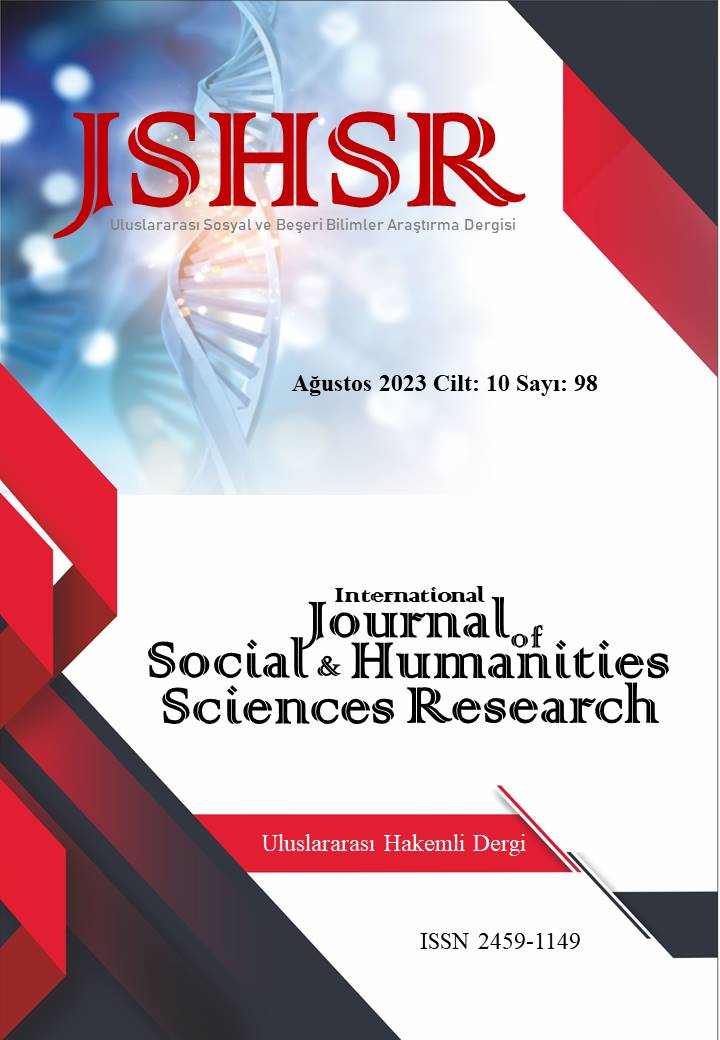The Effect of Working Conditions of Sefarers Working in Internal Waters on Work Performance as a Result of Leading the Work
DOI:
https://doi.org/10.5281/zenodo.8306949Anahtar Kelimeler:
Seafarer and Burnout, Maritime Management, Ship Management, Maritime Transport and Management EngineeringÖzet
In business life, employees sacrifice many things from their social lives in return for the time they spend at work, and in return, they have expectations to be satisfied in terms of business life. The sacrifices and expectations of employees in each sector are different from each other. In this study, the effects of the working conditions of seafarers in the maritime sector, which is a sector where employees give almost all their attention and time to their work and are easily affected by the negativities that occur, are examined. As a result of the seafarers being affected by the sea life, when the work desire and motivation losses are at the highest level, the thought of leaving the job manifests itself and it can reach dimensions that will cause occupational accidents due to reasons such as carelessness and wrong or incomplete work caused by the work of the seafarer. In this study, a group of seafarers consisting of 8 "captains", 8 "chief engineers", 76 "seamen" and 64 "oilers", who have worked on ships for a long time, experienced the difficulties arising from the ship, stayed away from family and social life, and had to work with more difficult conditions compared to the current ship conditions, and a group of seafarers who are younger than the other group, many of whom have their first work experience, in total. In the study, forms consisting of 4 sections were distributed using the survey method and 5-point Likert scaling as research management. The sociodemographic Information Form, Maslach Burnout Scale, Organizational Stress Scale, and Beck Depression Inventory were used to obtain demographic information of the participating seafarers. The data were interpreted using the SPSS statistical program. The statistical methods used were normal distributions with the Kolmogorov-Smirnov test, reliability with the Cronbach Alpha test, and parametric and non-parametric tests applied to analyze other data. As a result of the study, it was revealed that marital status and having children did not increase the stress level of seafarers, and age and working time on board had an effect on burnout levels.
Referanslar
Akcanbas, M. & Uslu, K. (2022). Gemi adamlarında stres, tükenmişlik, depresyon düzeyleri ve ilişkilerinin incelenmesi. OHS Academy, 5 (1), 33-49. https://doi.org/10.38213/ohsacademy.1084980.
An, J., Liu, Y., Sun, Y. & Liu, C. (2020). Impact of work–family conflict, job stress and job satisfaction on seafarer performance. International Journal of Environmental Research and Public Health, 17(7), 2191.
Aslam, S., Michaelides, M. P. & Herodotou, H. (2020). Internet of ships: A survey on architectures, emerging applications, and challenges. IEEE Internet of Things Journal, 7(10), 9714-9727.
Budiyono, B., Widyastuti, T. & Rianto, M. R. (2022). Effect analysis of compensation, work environment and leadership on ship crew loyalty with work motivation as intervening variable at pt. Salam Pacific Indonesıa Lınes. Dinasti International Journal Of Management Science, 3(3), 566-577.
Campbell, J. P., McHenry, J. J. & Wise, L. L. (1990). Modeling job performance in a population of jobs. Personnel Psychology, 43(2), 313-575.
Fotteler, M. L., Andrioti Bygvraa, D. & Jensen, O. C. (2020). The impact of the Maritime Labor Convention on seafarers’ working and living conditions: an analysis of port state control statistics. BMC Public Health, 20(1), 1-9.
Karadağ, Z. (2019). Denizcilik sektöründe çalışan gemi adamları ve kara personelinin psikolojik belirti düzeylerinin, çalışma koşulları ile birlikte incelenmesi. [Yüksek Lisans Tezi], Sosyal Bilimler Enstitüsü. Çağ Üniversitesi.
Kurt, Ö. (2010). Gemide çalışma koşullarının gemi adamları üzerindeki olumsuz etkileri. [Yüksek Lisans Tezi]. Fen Bilimleri Enstitüsü. İstanbul Teknik Üniversitesi.
Łosiewicz, Z., Nikończuk, P. & Pielka, D. (2019). Application of artificial intelligence in the process of supporting the ship owner’s decision in the management of ship machinery crew in the aspect of shipping safety. Procedia Computer Science, 159, 2197-2205.
Muslu, A. (2008). Denizcilik sektöründe insan kaynakları yönetimi ve çalışma ilişkileri. [Doktora Tezi]. Marmara Üniversitesi.
Okşaş, O., Emecen Kara, E. G., Özbey, T., Kaçmaz, E. & Karaoğlu, M. (2022). Identifying similarities of national yacht qualifications using hierarchical clustering methods. Sustainability, 14(19), 12622.
Oldenburg, M., Felten, C., Hedtmann, J. & Jensen, H. J. (2020). Physical influences on seafarers are different during their voyage episodes of port stay, river passage and sea passage: A Maritime Field Study. PLOS One, 15(4), e0231309.
Özalp, M., & Ümmet, D. (2022). Türk gemi adamlarında psikolojik iyi oluşun kişilik özelikleri ve belirsizliğe tahammülsüzlük değişkenlerine göre incelenmesi. Uluslararası Anadolu Sosyal Bilimler Dergisi, 6(4), 1395-1413.
Radic, A. (2019). Occupational and health safety on cruise ships: Dimensions of injuries among crew members. Australian Journal of Maritime & Ocean Affairs, 11(1), 51-60.
Taşdelen, U., Aksoy, R. & Çakmak, A. F. Gemi adamlarının iş-aile ve aile-iş çatışmasına ilişkin bir saha çalışması. Dokuz Eylül Üniversitesi Denizcilik Fakültesi Dergisi, 8(2).
Tunçel, A. L. (2020). Dökme yük ve genel kargo gemi kazalarının analizi. [Yüksek Lisans Tezi]. İskenderun Teknik Üniversitesi.
Uslu, O. (2021). 'Being Alone Is More Painful than Getting Hurt': The Moderating Role of Workplace Loneliness in the Association between Workplace Ostracism and Job Performance. Central European Business Review, 10(1), 19-38.
Yorulmaz, M. & Alkan, G. (2017). Denizcilik öğrencilerinin denizcilik sektöründeki kariyer beklentilerinin ve sektör çalışma koşulu algılarının analizi. Journal of Social Humanities Sciences Research (JSHSR), 4(10),471-480.
Zorba, Y. (2016). Tükenmişlik Sendromu: Gemi kaptanları ve güverte zabitleri üzerine tanımlayıcı bir çalışma. Dokuz Eylül Üniversitesi Denizcilik Fakültesi Dergisi, 8 (1), 97-127. https://doi.org/10.18613/Deudfd.74852.
İndir
Yayınlanmış
Nasıl Atıf Yapılır
Sayı
Bölüm
Lisans
Telif Hakkı (c) 2023 International JOURNAL OF SOCIAL HUMANITIES SCIENCES RESEARCH

Bu çalışma Creative Commons Attribution 4.0 International License ile lisanslanmıştır.


